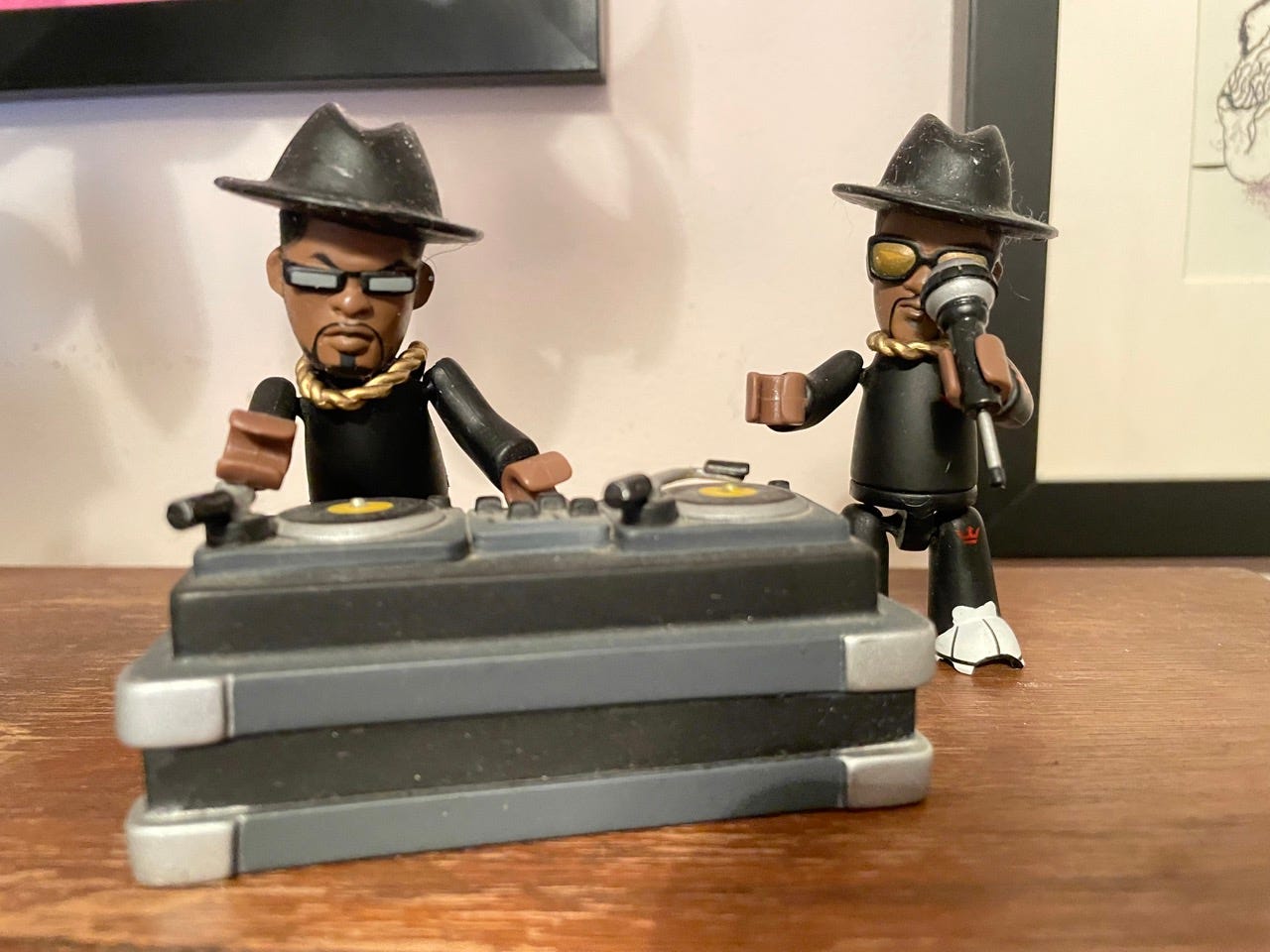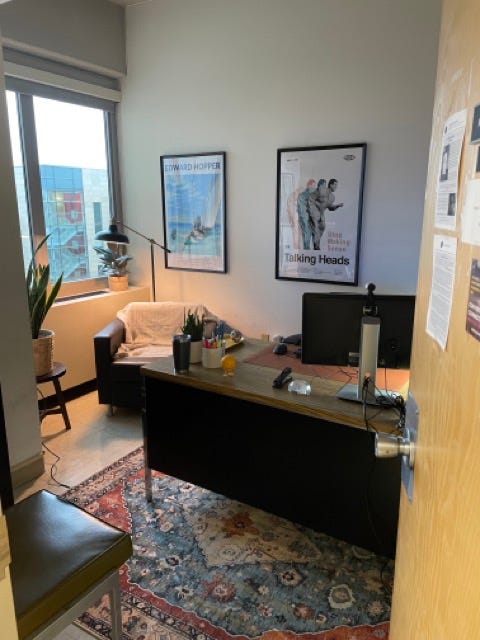Run-DMC Action Figures (acq. 2003)
In which I finally, fifteen years in, get comfortable in my job
These were a gift from a coworker, back when I had the kind of office job that involved a cubicle, overhead fluorescent lighting, and the expectation I’d show up at roughly the same time each morning. My coworker said she thought of me when she saw the eBay listing. “You could use some flair for your desk, don’t you think? It’s a little bleak over here.”
I hadn’t personalized my work space, beyond the branded swag I’d gotten at various energy-industry press events—I had enough of those foam stress balls to calm an entire high school math class on exam day. At 25 I hadn’t made any of the attachments—spouse, kids, pets—that people like to display in photographs pinned up beside their monitors. Also, I didn’t want to get too comfortable. I liked the job in many ways. I got to write every day, my coworkers were friendly, and my boss had enough faith in me to meet deadlines that for the most part he left me to my own devices. But at that age I still suffered from an overabundance of ego and ambition, which wouldn’t allow me to see the job as anything more than a way station. When I got a call at my desk one afternoon from the Iowa Writers Workshop, it seemed to confirm my long-held belief that I was destined for bigger things.
I’m not sure what it was about Run-DMC in particular that made my coworker think of me. Had I told her that Raising Hell was one of the first tapes I’d bought with my own allowance money, back in fifth grade? The year before, a Slick Rick tape had made the rounds of my friend group, having seemingly dropped from the sky, the way culture sometimes did in those pre-internet days. I had no context for the music, and it kind of blew my mind—weird, funny, a little dirty. But this isn’t an essay about a geeky white kid discovering hip hop in the suburbs of Reagan’s America. It’s about office decor.
After grad school, my friend Tom and I shared an office at Temple, where we were adjuncts and then lecturers. Whoever occupied the office before us had left a number of personal effects—posters (Frank Zappa, Robert Johnson); books (a hodgepodge of novels and writing textbooks and those huge Norton anthologies with their Bible-thin pages). Possibly it had been a series of people who’d left those things. The student papers in the filing cabinet went far enough back in time that flipping through them took on a geological quality.
I didn’t do much to personalize that work space, either, but for different reasons than at the office job. There, I’d worried about getting comfortable and staying too long. At the university I worried that the decision to stay wouldn’t be mine to make. Even after the job title was upgraded from lecturer to “assistant professor, non-tenure track,” I had to apply for a new contract each year and hope the next round of university budget cuts wouldn’t include me. Whenever I contemplated bringing some decor into work, I also had to contemplate one of those familiar movie scenes where the recently fired has to hurriedly gather their personal items and carry them out of the building in a box. Maybe whoever had preceded us in the office found that too sad, or embarrassing, and chose to simply leave their things behind.
In the status-obsessed world of academia, you’re reminded pretty regularly, in ways both subtle and overt, where you stand in the pecking order. I remember being told, by a colleague who probably thought they were being helpful, that I shouldn’t describe myself as “faculty,” a word generally reserved for the tenure-track folks, who might take offense. A different colleague told me the same thing about “professor,” even though by then the word was literally in my job title. Once, when explaining why there was no need for me to attend department meetings—I wasn’t allowed to vote, for one thing—a senior faculty member said, “You’re lucky, really. All you have to do is teach.”
Why was that last paragraph so difficult to write? Is it because I’ve internalized academia’s status judgments to the point where, on some level, I’ve come to believe them? I teach writing courses, which as “skills” classes have historically been viewed as lower on the status ladder than more narrow, subject-area specialties: Romantic poetry; modernism; critical theory. That’s especially true for first-year writing, which is what I was initially hired to teach. My former boss, a few months before retiring into distinguished emeritus status, told me he’d spent much of his career fighting against the perception that rhetoric and composition were “housekeeping,” rather than intellectually interesting scholarship.
In those early years at Temple, I think my resistance to decorating was defensive. The way you might hold yourself aloof from someone you’re dating when you’re unsure of their feelings. In that sense, hanging my own prints on the wall, or covering the scuffed industrial tile with a rug, would be akin to inviting a casual hookup to have dinner with your parents. I could imagine some of the snobbier senior faculty gossiping behind my back. “Did you see he put a couch in there?” one of them might say. “It’s sad, really. Does he think this is actually a career?”
These action figures have one major design flaw, which is their top-heaviness. You have to really work to make them stand upright; even if you lean them against the DJ table, a slammed door or heavy footsteps can cause them to teeter over. Many mornings, I’ve keyed into my office to find them on their backs, like a crime scene or a medical emergency.
In those early days at Temple, they were one of the few personal items I brought into the office. They were small, for one thing. Also, my students might find them funny, I thought. If they asked about them, it could spark an interesting conversation about their own early musical discoveries. I enjoyed chatting with my students, learning about their lives. Also, selfishly, if those students decided they liked me, they might be more apt to write nice things on my end-of-semester evaluations, which could help me keep the job for another year.
When my grandfather was still alive, he loved to tell people at his retirement home that his son, my father, had been a Navy Captain. It wasn’t just that my dad had commanded a nuclear submarine; the rank itself seemed to matter to him. He took a similar pride in telling the other residents that I was a college professor. Whenever he did that, I had to fight the urge to clarify: I was only an assistant professor, or later an associate. Also, it wasn’t the tenure-track. As if one of those senior colleagues might be lurking around the corner of my grandfather’s Gulfport, Mississippi retirement home, waiting to catch me stealing academic valor.
I’d done the same thing, early on in the job, when I visited old friends in D.C. I didn’t even realize I was doing it until my then-girlfriend pointed it out. “I don’t think your friends really care about the distinction in rank,” she said. “They all just think it’s cool you get to teach college.”
I’ve always cared too much about other people’s judgments. I can’t blame academia for that, even if there are aspects of academia that don’t exactly help. Maybe it’s genetic: both my grandfathers were, in their own ways, obsessed with status. My mom’s father let it sink him into a middle-aged bitterness from which he never recovered. It’s something I have to be mindful of, to work at. I’ve gotten better, in fits and starts.
At this point I’ve been at Temple for more than fifteen years. Long enough to have earned a branded paperweight and a desk clock. Last semester, I was promoted to full professor, which, combined with our most recent union contract, will make for a pretty nice raise. Though in my email signature I still have to make sure I follow “professor” with “of instruction.” Which I’m fine with, mostly. Teaching, it turns out, is the part of academia I like best.
These days I get to teach a nice variety of classes. Fiction, creative nonfiction, an editing and publishing seminar. This semester, for the first time, I’m even teaching a grad class. I still do some first-year-writing, too, which conventional academic wisdom says I shouldn’t enjoy, but I do. It can be labor-intensive—lots of papers to comment on; frequent homework assignments to grade—and you get some students who aren’t exactly pumped to be there. But that only makes it more rewarding when they tell you they liked the class, that they got more out of it than they expected, when you can see the tangible results in their final papers.
Recently I moved into a new office, which is what’s gotten me thinking about all this stuff. Actually it’s the same office I used to share with Tom. Now, after a few years elsewhere, I have it to myself. The last couple Saturdays I’ve driven up to campus so I can work on the space while the halls are otherwise quiet. I’ve hung a few framed posters. I bought an inexpensive rug, and a floor lamp, so I don’t always have to rely on the harsh overhead fluorescents. I brought some books from home, and rearranged the furniture to give myself a little reading nook.
On the door, next to my posted office hours, I taped up the publisher’s press release for my first book. Though as I did so, I wondered at my motivation. Was it a simple pride in the accomplishment? Or was it meant as a little talisman of status, a signal that I actually do belong here?



